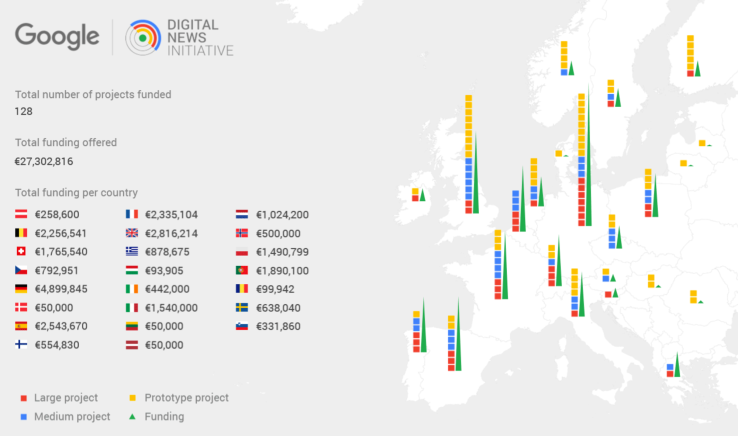
Pouring gas on the bonfire of news tech, Google recently announced that it has invested more than €27 million ($30 million) into projects spanning the European news tech scene. The fund’s goal is to ‘help stimulate innovation in digital journalism’ over the next three years, Google’s CEO Sundar Pichai said at an event in Paris last week. This batch of investments is the first from a €150 million ($167 million) fund the company announced last year.
“The funding will go to a wide variety of organizations”, Pichai said, describing the companies applying for the Digital News Initiative (DNI) funds as “wonderfully diverse, ranging from automated content personalization and robot journalism, to hoax-busting apps and tools to verify social media in real-time reporting.”
Google and European news organizations have had a tense relationship over the past few years, and Google no doubt hopes to mend some bridges with the Digital News Initiative. In Germany, for example, publishers wanted Google to pay for using short snippets of copy on Google News. The spat culminated in Google making inclusion in Google News opt-in and temporarily de-listing a large number of news organizations in Google News.
The new fund is designed to fund projects in three categories, including ‘prototype projects’ requiring up to €50k ($55k) of funding to build a prototype. In addition, the fund is open to medium projects open to startups and news organizations requiring up to €300k ($333k), and large projects, open to larger organizations with more ambitious goals requiring larger amounts of funding.
Among the 128 projects, Google highlights El Diario, a Spanish news site that is creating a new journalism funding system based on a crowdfunding model. It will identify niche groups of audiences and invite them to fund a specific story or top up the financial gap in an important coverage.
Another recipient of project funding is the German startup Spectrm. It will use the funds to build an artificial intelligence engine to help publishers communicate directly with readers via instant messaging apps.
The first round of investments is distributed across startups in 23 different European countries, with the largest project investments made in Germany, the UK, Spain, France and Belgium.
